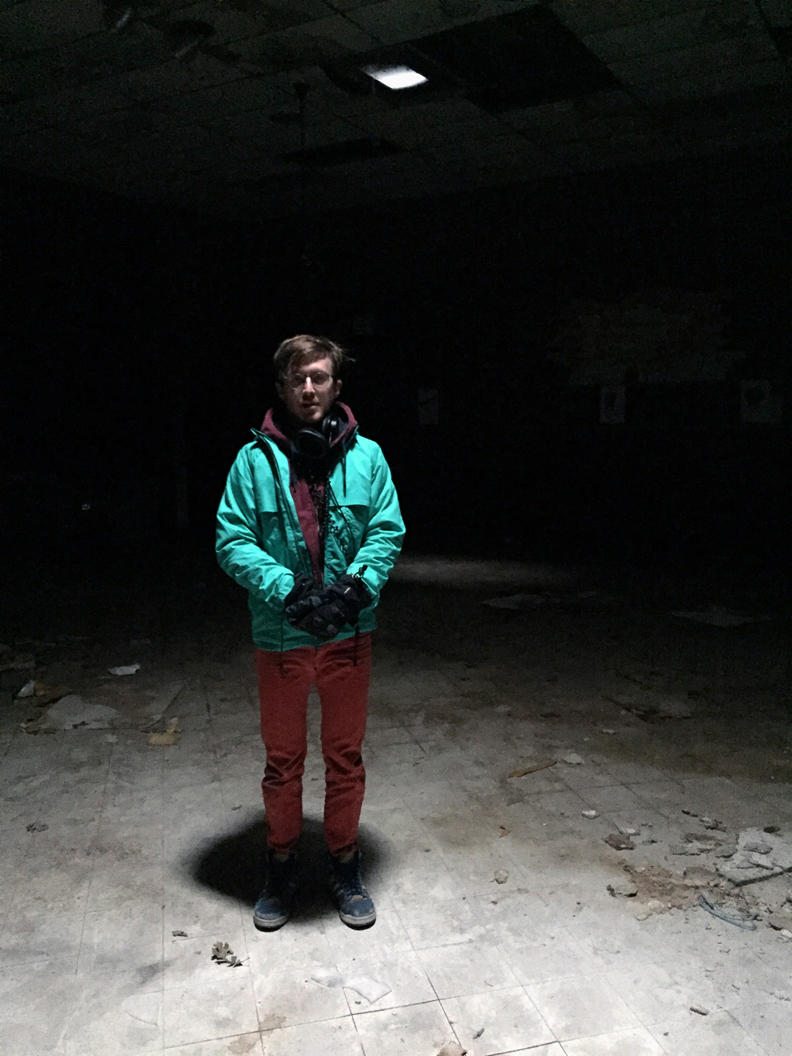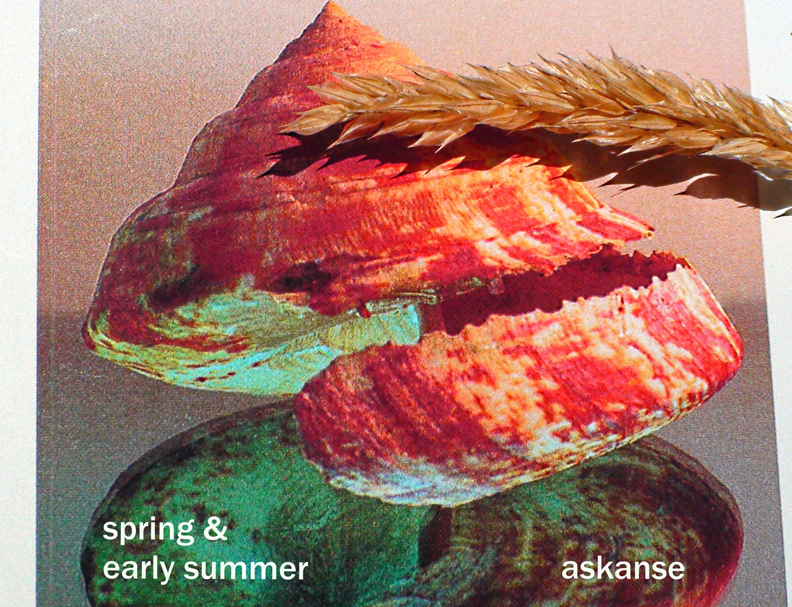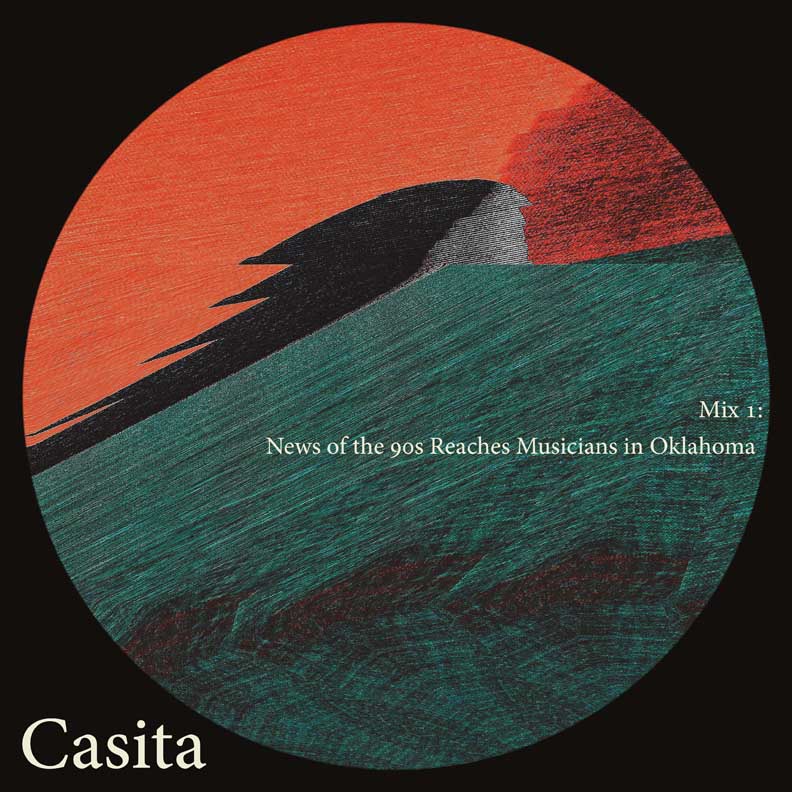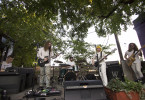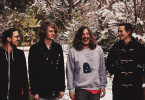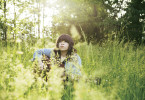Thoughtful, eloquent and measured, Ben Hill speaks about his music they way he approaches it. Performing as Askanse (pronounced “uh-skance”), his Four Tet and Boards of Canada-indebted debut album Spring and Early Summer — one we listed as one of the best Oklahoma albums of 2014 — imbues a soothing sophistication, a head-in-the-clouds record built on organic loops and inspired but subtle hooks that speak to his past performing more traditional EDM. It’s intoxicating, hiding crowd-pleasing grooves underneath layers of giddy, whimsical experimentation … and it’s something we almost never got to hear.
Hill was all but done with music a few years ago, burnt out and looking to leave it behind for something new. But that fire relit and is burning hotter than ever, and the soft-spoken artist is eager to dip his hands into as many projects and collaborations as possible. He’s a co-founder of Casita Records, one half of electronic duo Thoma and he just launched new monthly Casita Records Mix series, the first entry of which finds Askanse dabbling in fast-and-loose hip-hop deconstruction, and the style of the mixes will evolve in scope and sound as time passes. Then there’s Boogie Fever Saturday, a new monthly dance party at Dope Chapel debuting this Saturday that features Askanse on the debut bill, along with Sardashhh, ReadMi and SimStim.
Askanse chatted with Oxford Karma about these new projects, his passion for art collectives, Korea and the benefits of taking long walks outside.
Oxford Karma: How did Askanse come to be?
Hill: Askanse has its roots in my prolonged senior year of college. I had produced electro-house in freshman and sophomore years, became totally disillusioned with music in junior year and came crawling back senior year. I began writing more moody guitar music as a form of emotional release. I had always wanted to write epic pieces, and Askanse was basically a way for me to totally escape the constructs that dance music imposes and try to grow as a songwriter.
OK: What are your roots in music? And how’d you eventually get wrapped up in producing/composing electronic music?
Hill: My parents are both musicians. My dad plays the violin, and my mom plays the accordion, and they would play at contra dances when I was growing up (my dad still plays for them). So I listened to a lot of Irish, Scottish, English, and traditional American folk music as a child. I took classical guitar all throughout high school, and that’s actually how I know a lot of what I know about the construction of music. I played in bands in high school, a dance-rock band and some blues-rock bands. I also began to make club music. I had been DJing since I was 15 (I actually had a set Robotic Wednesdays when I still in high school, which is retrospectively kind of phenomenal). Consequently, trying to make club tracks was my primary impetus for learning how to use computers to make music. But at the same I was DJing and listening to all of this club music, I was also listening to artists like Boards of Canada, Four Tet, Caribou/Manitoba, Ratatat/E*vax, Radiohead (especially Kid A), Apparat/Moderat, Air (especially the Virgin Suicides soundtrack), and it was these artists whose music really stirred something deep within me. They made what seemed like impossibly beautiful, organic, complex music, and a lot of it with computers. Over time the disconnect between the music I loved and the music I was making became too great, and so I focused more and more exclusively making experimental, emotive electronic music. Also, being a computer musician affords you the unique opportunity to work exclusively on your own. I always disliked having to rely on others to make things happen. Right now, I feel like I’m coming back around and getting more interested in doing dance music again, but trying to do it a different way.
OK: What’s it like being an electronic artist in Oklahoma? And how does that present reality compare to what it was a year or two back?
Hill: It’s strange. It’s lonely because there aren’t a lot of outlets for people who make electronic music. But it’s also an inherently isolating kind of music, made by people who like to spend a lot of time alone in their rooms, so I can’t really blame Oklahoma for that. But still, it’s basically a kind of music that only a small subset of the population is really going to be into. Further, the music doesn’t really lend itself well to a live context; I think it’s best enjoyed on headphones, by yourself. That said, a couple years ago, I literally would have had nowhere I would have felt comfortable performing something like Spring and Early Summer, but Dope Chapel in Norman has really opened up that possibility. I’m extremely thankful to be part of an artistic community of supportive, interested people, and to have a space to share what I make. I’m not sure I would still be making music if I didn’t have the chance to play there periodically. I would still say, however, that there is a certain nihilism that comes being an electronic artist here. It can seem kind of hopeless, and I think a lot of great producers sell themselves short. That’s why it’s also super nice that Safari Collective has come into being. It’s good to have that encouragement and support.
OK: There’s a really organic feel to a lot of what you’ve made and released as Askanse so far. What attracts you to that aesthetic? And what are some of the biggest influences (music-related or otherwise) that you carry into your process?
Hill: I like music that creates a headspace for you to be in. I like music that’s dynamic and engaging, but doesn’t necessarily force you to think about it a certain way. That’s why I love instrumental music so much: The meaning can mold to fit your particular situation. I spend a lot of time outside. I record a lot of ambient noise. Every day I make it a point to go for a long walk or bike ride; I love the space that it creates, and that’s ideally what I want to create music for — music that might help guide you to a deeper understanding, subtle music that encourages a sense of discovery, that’s emotionally poignant without being overt. I think about context a lot. It’s unfortunate that we live in a time where people often consume music by listening to it over the phone or through laptop speakers — so much of hard work expended on subtle detail is lost there.
OK: In addition to Askanse, you collaborate with Stratus as Thoma. What do you think the chief artistic differences between your solo work and duo project are? Where do you get pulled working with another mind that you might not otherwise go?
Hill: Stratus, or Tristan d’Liege, is a longtime friend. We have a good tension when working together. He’s more cinematic, I’m more minimalist (although I’m still a maximalist at heart). I think with Thoma, I just make what seems natural for us to make together, and I agonize less over it, because working within someone helps me to be less emotionally attached to the work. When I work on my own things, especially if it’s really personal, I agonize over the details for a long time, because I feel like it has to represent me exactly as I want to be represented. With Thoma, we also usually work under a really heavy time constraint, so I don’t really second guess myself and try to go with my gut feeling. Tristan is applying for a Ph.D in philosophy, so we usually have long debates over how a song should be. As a matter of course we rarely agree, and I like that. It forces me to challenges assumptions that I would have left unchallenged in my own work.
OK: You’ve also undertaken a label, Casita Records. What attracted you to that endeavor? And how do you hope to see that evolve moving forward?
Hill: Casita Records arose basically out of necessity and, oddly enough, complacency. I really don’t like sending my work out everywhere. Like a lot of artists, I see promotion as somehow antithetical to creating genuine art. So I needed a way to release my music, and I wanted a banner under which to incorporate a variety of projects, and so Casita was born (it means “little house” in Spanish, the idea being it’s a sort of home for all my ideas). I hope to see it evolve into a more holistic art label, kind of in the way that Ghostly International operates. That is, incorporating visual art, design, and hopefully even poetry and literature. I want to help grow the arts in the Midwest. There is so much richness that never gets shared. In the short term though, I’ll continue releasing Stratus, Askanse, Thoma, and potentially Comma material, as well as releasing monthly mixes and doing a lot of graphic design stuff. I’d also like to eventually host regular art parties that incorporate music and other mediums.
OK: You are doing this monthly mix series. How did that idea pop into your head?
Hill: It’s something I’ve been wanting to do for a long time, so I finally just sat down and did it. I create a lot of stuff that just gets shoved in some corner of my hard drive, it would be way better for me to be pushed to actualize it, even if it’s not perfect. I see the mixes as a way for me to toy with ideas as they’re being developed.
OK: You push the music into a more hip-hop flavored place with this first mix. Is that a feeling that will hold with each one? How do you hope to see it change moving forward?
Hill: Ever since I worked with Sardashhh I’ve been kind of playing with hip-hop as a way to perform more improvisationally with Ableton. I’d been playing these DJ sets for almost six months full of tracks concepts and a capellas that only existed whenever I performed them. So it was really high time that I actualized it into something that could be shared. The next month will be curated by Stratus, I’m thinking it will be more afrobeat and bossa nova influenced. I still have a lot of beat concepts that no one has heard, so I could keep up with these mixes like that for a long time, but it will undoubtedly change as my passions and interests do. My hope is that it becomes more ambitious, I bring more DJs and musicians in, and it becomes more multimedia, with poetry or spoken word sections — prose, even — as well as ambient/drone music. I want to curate a panoply of sound. I want it to be unexpected.
OK: You’ve got the first ever Boogie Fever Saturday at Dope Chapel coming up this weekend. What about this new monthly event are you excited about (and challenged by) as an artist?
Hill: I’ve been fantasizing about the ultimate funk/disco set for a long time now. I have an immense love for funk, disco and early house music (especially French house). I’m excited to chop all that up, re-contextualize and make it my own. I also plan to make a house record with a friend in April or May, so this help towards preparing for that. There is nothing too challenging about it; this kind of music is my bread and butter. It’s what comes most naturally. That being said, it can be a total pain to get older funk tracks to warp nicely. The groove is so loose, but that’s my own cross to bear.
OK: With all these different projects going on, when do you see yourself putting out another Askanse record?
Hill: I’ll likely be putting out some singles in the next month, as well as a Thoma release and other collaborations, but an Askanse full-length is still a little ways off. I’d basically written an album before I even started working on Spring and Early Summer, which happened very quickly as part of preparing for Loopfest 2014. The material I have yet to release is a pretty epic and gloomy affair that I wrote mostly in Korea and immediately after coming back from Korea. It samples heavily from Indian music. I’d hoped to put it out before the weather got too nice, but that proved overly optimistic as I’ve gotten more ambitious about the scope of it. I may be moving back to Korea in the future, so I’ll likely finish it there. In the meantime, I’ll probably be releasing stuff that’s more oriented towards DJing, I’m just not in the right mood to finish the Askanse album, but it’s something that I’m always thinking about.

